
B Corp Greenwashing: How Ethical & Reliable Is Their Certification?
What is the purpose of the B Corp distinction for businesses?
Companies ranging in size and influence–including Ben & Jerrys, Patagonia, Danone, Toms, Aesop, Kickstarter, and more recently, Nespresso, are but a sample of the 3500+ companies in 77+ countries to be accredited with their certification.
For-profit businesses with the B Corp certification should demonstrate they adhere to the triple bottom line: that is, they strive for both profit and purpose and promote positive change in their communities. These companies are meant to have a commitment to business as a force for good.
But are B Corps as ethical as they claim to be?
How reliable is the B Corp stamp of approval and is it really the crème de la crème of eco-conscious labels or is B Corp greenwashing us all?
We live in a beautiful world rife with greenwashing. Coffee giant Nespresso’s recent addition to the B Corp roster has thrown the certification into the limelight of controversy. Especially in the global sustainability community, red flags are being raised.
To help you navigate the line between authenticity and artifice, we’re taking a deeper look at the B Corp criticism to decide if their certification is as legit as they say it is.
The Full List of B Corp Ethics & Reliability
1. B Corp Overview

B Corp was founded in 2006 by a small group of Stanford University businessmen and alumni. A year later, the first generation cohort of 82 companies were certified as B Corps.
Through extensive lobbying and marketing B Corp expanded across the globe, and today boasts over 3500 accredited businesses on every continent.
Companies wish to get certified for a variety of reasons.
The B Corp badge demonstrates they’re committed to doing better, but it also helps to attract top tier talent, gain customer trust, and develop other competitive advantages.
While companies must recerify themselves every three years, the certification is not legally binding and there are no mandatory published yearly reports. Companies can terminate their B Corp status at any time.
And many do. For example, Etsy decided in 2017 that the input of their stakeholders trumped the values they promised to uphold as a B Corp.
We’ll get to more B corp issues and criticisms later.
It’s interesting to note that organizations are not accredited by the B Corp brand itself, but rather its not-for-profit sibling called B Labs. B Labs has raised more than $32 million in the past few years, sounding further alarms as to the real motives behind B Labs.
The Lab is funded by mostly earned income from members, but it also receives contributions from A-list donors like JP Morgan and The Rockefeller Foundation. Companies who wish to become B Corp certified must wait two years to apply after donating money.
These funding factors have called into question the actual independence of the organization by watchdogs and advocates.
2. How Companies Become B Corp Certified

A company only has to be in operation 12 months before becoming B Corp. When a company wishes to become B Corp certified, they must achieve a minimum score on the B Impact Assessment, have it verified, and then pay a certification fee.
Standards for assessment are set by the B Labs Standards Advisory Council, composed of academics, business experts, financial experts, and representatives of large B Corp organizations like Patagonia.
It takes just a few hours to do the initial assessment, then another 3-8 weeks of gathering the documentation to submit, and $500-$50,000 in fees depending on revenue.
The impact assessment—essentially a deep dive into a company’s Corporate Social Responsibility (CSR)—is at the core of B Labs’ certification process. It has about 200 questions that focus on day-to-day operations and the company’s business model.
The assessment looks at things like the company’s policies and practices, their mission statement, environmental and social commitments, and company ethics. It also looks at metrics like:
- How many full-time employees are paid a living wage
- Benefits
- Company contributions to the community
- Green building standards
- Greenhouse gas offsets
- Management of customer data
- Supply chains
- Legal issues.
Companies receive a score out of 200, and have to achieve at least 80 to join the B Corp roster. Importantly, there is no minimum score per section, if a business fails in one section, they can make up for it in another.
B Corp believes this is the best approach, because it is holistic.
According to their website, “B Corp Certification is a rigorous and holistic certification demonstrating that your business is meeting high standards of performance, verified by transparency and accountability requirements.”
3. Is B Corp Greenwashing?
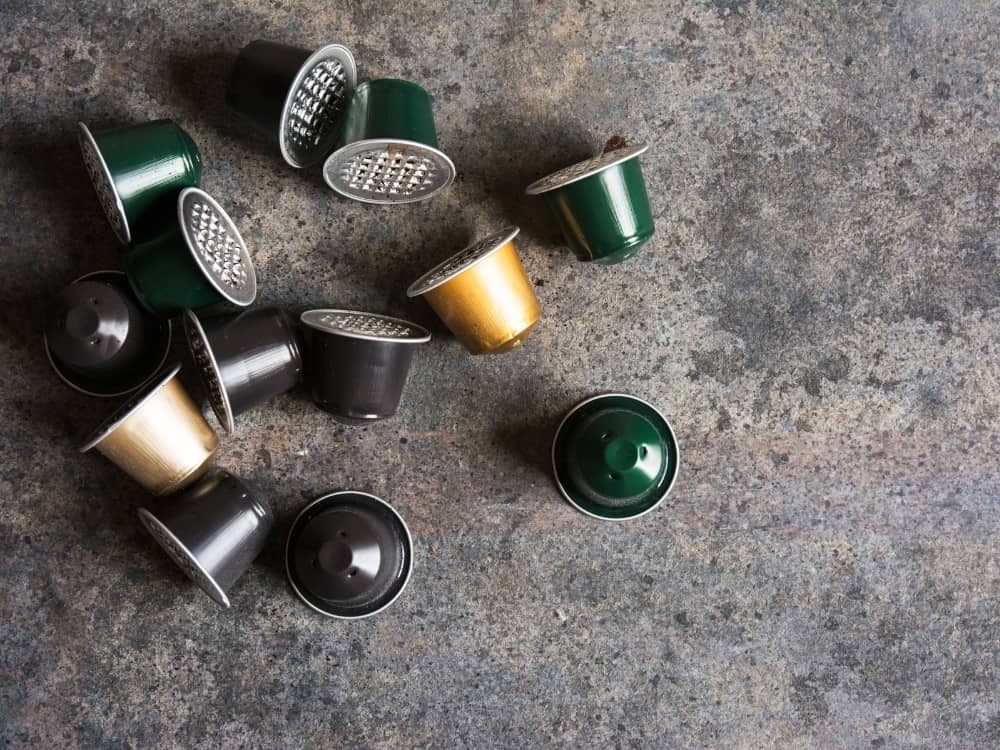
The answer to this is probably more dependent on the company than the certification, which begs a further question: how reliable is B Corp accreditation?
Without a doubt there are many B Corps who are legit and doing better, like Dr Bronner’s who is arguably a more activist body than corporate—but how much does the average B Corp truly reduce their negative impact on the planet and its peoples?
It’s difficult to know.
B Labs assessments do not clearly state a goal or requirement that must be met. It’s more like areas of various business practices are investigated via a questionnaire.
They list their standards, but they don’t actually show clearly the performance of a business against those standards. B Corps do not publish the data from the impact assessments.
Without full transparency, it’s hard to say if their standards (and the B Corps themselves) really drive positive change.
Nespresso B Corp Criticism And Controversy
Recently the Fair World Project, a fair trade advocacy organization and certification watchdog, called BS on B Corp and B Labs.
Fair World Project petitioned that Nespresso’s welcome into the ranks as a certified B Corp robbed the label of its legitimacy.
“There’s a long history of certifications getting co-opted by corporations as they reach the mainstream,” said Dana Geffner, Executive Director of Fair World Project. “We’ve seen it with fair trade certification as well as organics. Unfortunately, Nespresso’s certification suggests that B Corp certification is heading that way as well.”
Nespresso received its status in May of 2022 “despite a recent history of human rights violations on farms that grow their coffee including child labor, wage theft, and abuse of factory workersm,” wrote Fair World Project in their press briefing.
Nespresso is also widely criticized for their aluminum pods, a difficult to recycle and resource-intensive product to mine, refine and manufacture.
When a company’s history and core business model is the cause of so much negative impact on the environment, you have to wonder what the B Certification really is all about.
An Open Letter to B Lab Global
Both coffee and non-coffee initiatives with B Corp status banded together with Fair World Project after their initial Nespresso call-out. Peace Coffee, Dr Bronner’s, Lotus Foods, and thirty other B Corps together penned an open letter to B Lab Global.
The letter stated, “The fact that Nespresso can achieve a score that allows them to be certified as a B Corp and use the certification to greenwash its business model and practices demonstrates that the B Impact Assessment scoring system and certification process is in serious need of repair.
“Without a structurally higher certification bar and a mechanism for enforced accountability within the B Impact Assessment or certification process, we are concerned that corporations will do the bare minimum to ‘greenwash’ themselves as B Corps.
“Although Nespresso has achieved the minimum currently required for certification, scoring 84 out of 200 points, Nespresso’s abysmal track record on human rights from child labor and wage theft to abuse of factory workers is well documented by the media and NGOs.”
While B Corp states that its certification is “for companies already practicing responsible business,” Nespresso was welcomed into the fold on the heels of promises it made to do better.
But the way in which B Labs operates, there is currently no means for the B Impact Assessment or the certification process to measure or hold Nespresso accountable to their self-imposed commitments that they made upon certification, which included a promise for all viable farms to reach a living wage by 2030.
The obvious question there being: If you’re a B Corp, why don’t the majority of your farmers already receive a living wage?
The Nespresso debacle has laid bare many of the fallacies of a privately owned and funded certification like B Corp.
B Labs’ Denies Standard at Risk
B Labs’ response to the Nespresso debacle doesn’t paint them in any better light.
Dozens of B Corps, advocates, and watchdogs called out the entity for their abandonment of their original mission, to which they defended their choice.
B Lab confirmed to global brand innovators Sustainable Brands that it received the petition letter and directly engaged its signatories but would not revoke Nespresso’s certification on the merits of the letter alone.
“B Lab will not be revoking Nespresso’s certification due to the open letter,” said Alexa Harrison, Senior Public Relations Manager at B Lab US and Canada.
“Nespresso, following an intensive three-year process, has met all of the certification requirements—which include scoring a minimum of 80 on the B Impact Assessment, meeting the legal requirement; a risk assessment, disclosure and transparency; as well as additional requirements for a company of its size.”
Andy Fyfe, Director of Equitable Growth at B Lab US and Canada used the vast size of Nespresso as a reason to keep them. “A known, global brand like Nespresso joining the community is important to the overall vision of a more responsible economic system,” he said.
“It opens up an honest dialogue that we rarely see in our current, capitalistic system…The more brand awareness of what it means to certify means its influence will reach more multinational industries and companies, increasing the potential for collective impact.”
Unfortunately, it’s difficult to reconcile B Corps stated mission to positively transform the world with their expansion and fundraising agendas.
4. More B Corp Issues & Controversies

Greenwashing isn’t the only criticism of B Corps.
The following is a breakdown of other recent well-known B Corp issues and controversies that question how ethical B Corp is, and to what extent they’re a legit green flag for consumers.
Danone – A Shake-Up for Stakeholders over Sustainability
Danone is one of the only multinational corporations to have almost all of its brands designated as B Corp. They promise to do so by 2025 and were previously heralded as a shining example of how multinational corporations can better serve their stakeholders and the earth.
Then Danone’s board ousted its CEO of seven years, Emmanuel Faber, who was largely responsible for prioritizing positive impact over dividends for shareholders.
Shortly after and Danone was featured in the news for creating a local crisis by ditching contracts with small New England farmers for “supply chain inefficiencies.”
BrewDog – Toxic Work Culture
Mere months after BrewDog was certified in early 2021, a group of former employees published an open letter accusing the alcoholic beverage firm’s business practices and CEO of being “toxic” and committing sexualized violence.
The allegations go against the very heart of what it is to be a B Corp.
BrewDog’s example is testament to the flawed methods and criteria which B Corps are tested against; its processes do not deal with business culture.
But company character is crucial. It is concerning that an organization with a predatory and toxic work culture can still achieve B Corp status so long as it satisfies the three Ps.
New Season Markets – No Remediation Needed
New Seasons Markets, a B Corp grocery store, shows the dangers of a certification where there is no requirement to keep making progress as a “force for good” over time.
Their score has declined 33% since they became a B Corp. Their union busting made headlines in 2018 and earned them numerous complaints to the National Labor Relations Board.
The B Corp response to their activity, which went against both international labor standards and labor law, was to have New Seasons Markets state their own side of the story in a disclosure that is deeply buried in their assessment profile.
There was also zero requirement to remediate in order to maintain B Corp status.
Innocent Drinks – Single-Use Plastics and False Advertising
Innocent Drinks sells smoothies in single-use plastics and is owned by the worst plastic polluters in the world: Coca Cola.
Innocent Drinks also recently had its advertisements banned in the UK after an activist network Plastics Rebellion filed a formal complaint for their blatant greenwashing. Innocent Drinks remains on the B Corp roster without any pressure to do better.
5. Is A More Ethical B Corp Certification Coming?
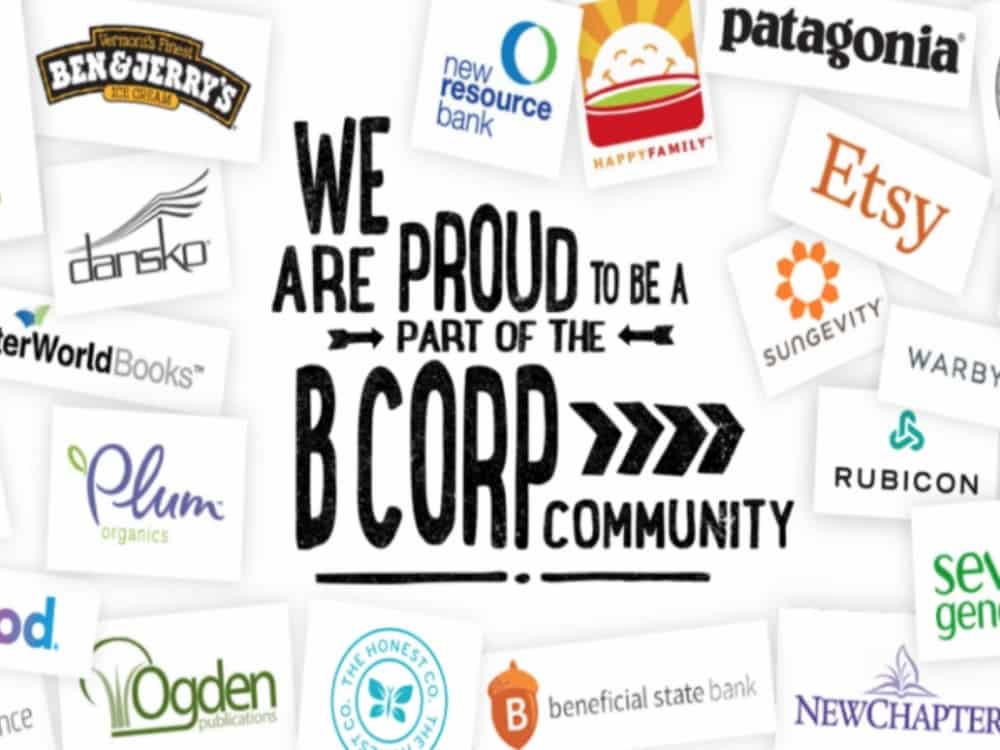
It’s not all doom and gloom for B Corps. After all, there are still numerous B Corp businesses using their power and product as a force of good.
There is a strong argument in favor of introducing a minimum score in each of the five impact areas of assessment so that companies with a really poor score for the environment, for example, wouldn’t qualify for certification.
There is also a push for the certification to become legally binding, or to have global governance bodies like the UN more involved to uphold standards.
Consumers should be able to see a B Corp logo and know they’re looking at an environmentally sustainable product where humans were likewise unharmed in its creation and sale.
In response to growing public scrutiny, B Labs just kicked off a full review of their standards. The goals of this effort seem encouraging, to address many of the criticisms advocates have been calling out.
Time will tell whether B Corp can create a set of minimum standards and thresholds that are objectively quantified and made public, anything less may see the continual decline in consumer trust and confidence.
Did you know we Have a Newsletter?
We cover the latest in sustainable living, fashion, zero waste, beauty, travel, finance and more…
Final Thoughts On B Corp Greenwashing Controversies
As with BCI Cotton, GOTS and other manufacturing certifications, they are no guarantee their claims are always true.
The same can probably be said for all certifications including the B Corp certification.
But what does that mean for you as a conscious consumer?
The reality is that a number of corporations with the B Corp certification are not people and planet focused so much as they are profit, where stakeholders are prioritized above all.
And those same corporations are likely not solving the world’s most challenging problems. They’re driving them forward.
That these corporations are receiving the same status as their problem-solving counterparts with real equity needs to change.
That does not wholly delegitimize B Corp. There are many businesses that genuinely represent its intent and we should continue to support them. It just means you can’t take their certification as the be all and end all and nor should you with any certification.
Seeing a B Corp logo is still a green signal for us—but as it currently stands, we still need to discern for ourselves if that signal is green or greenwashing.
Pin these:
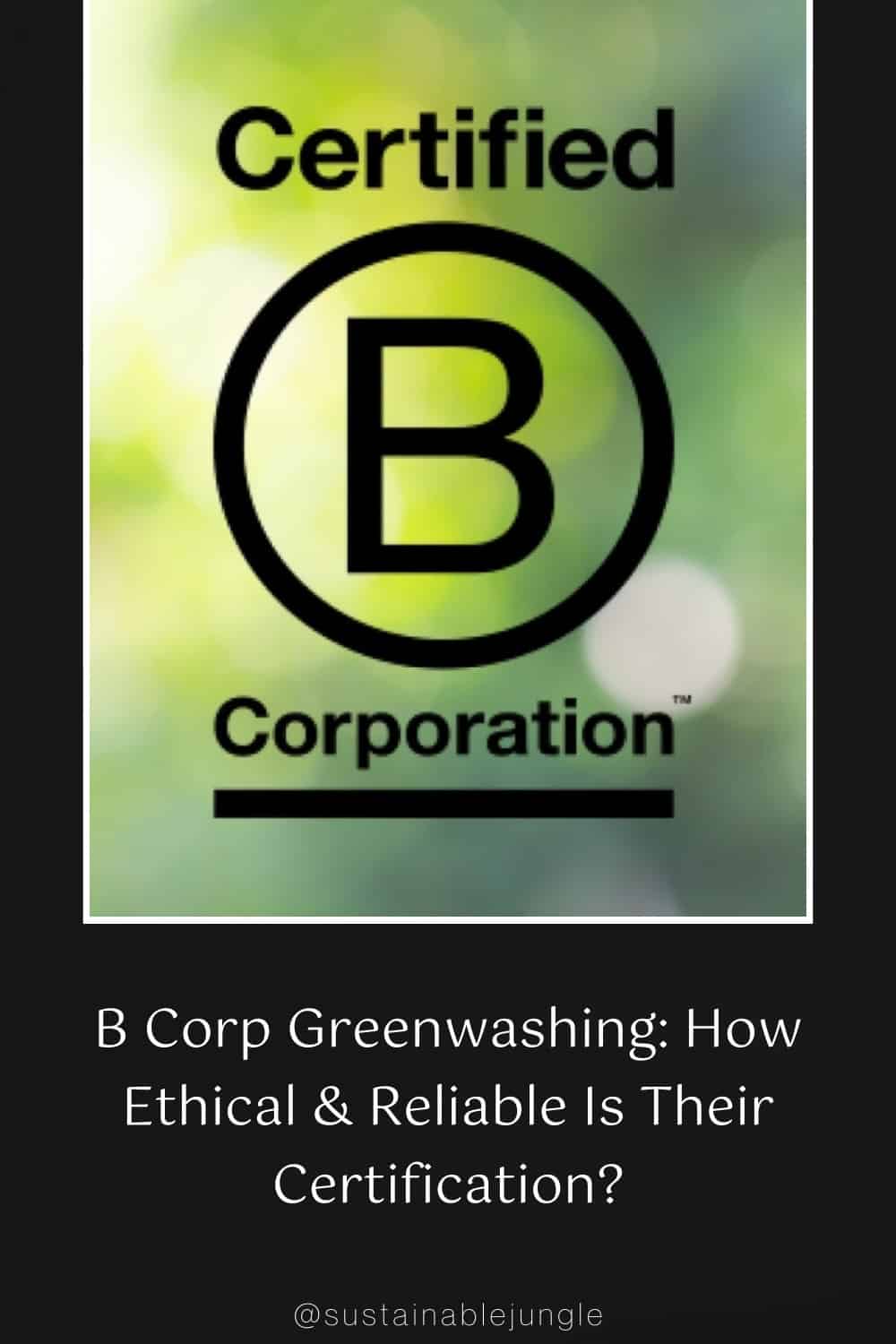
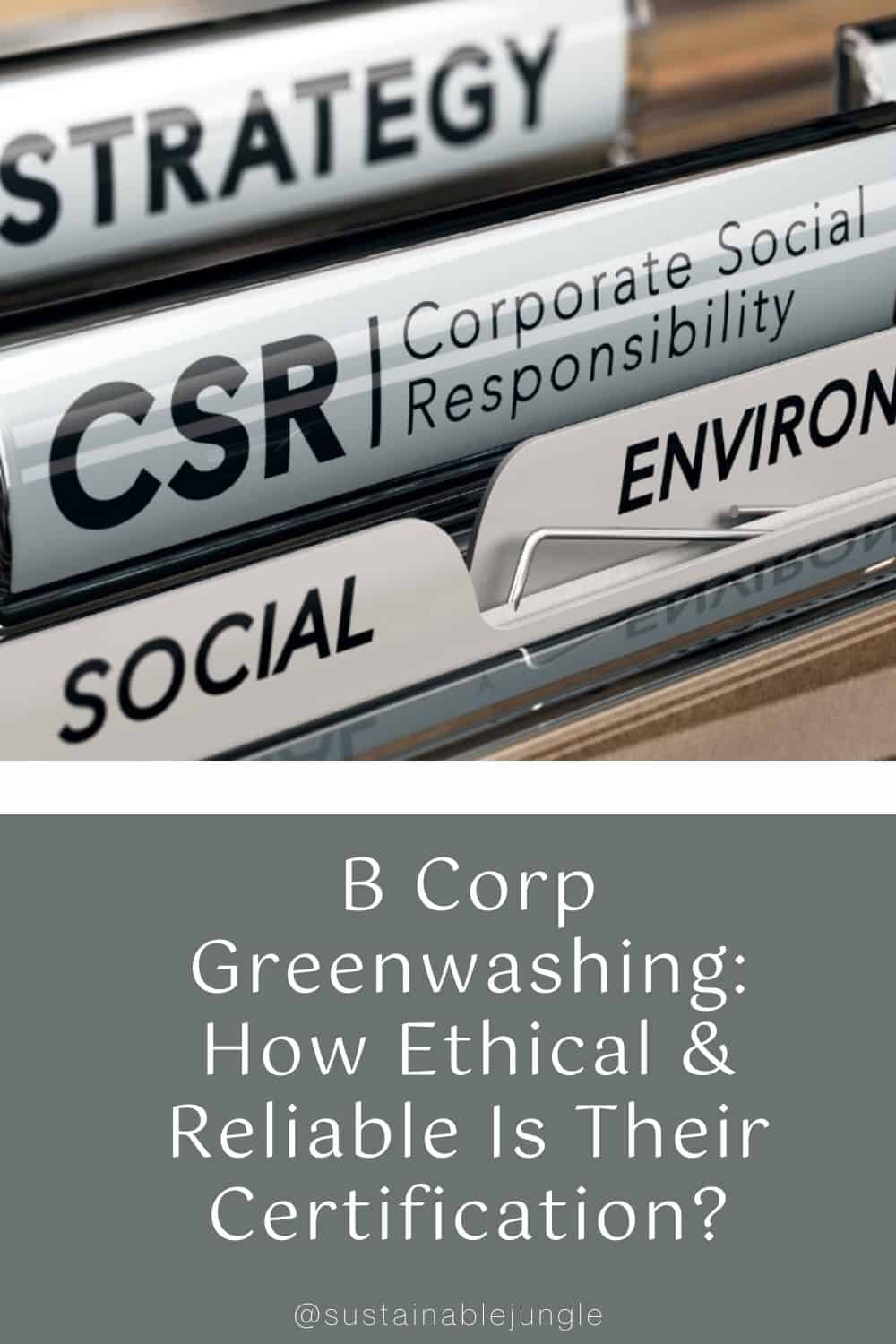


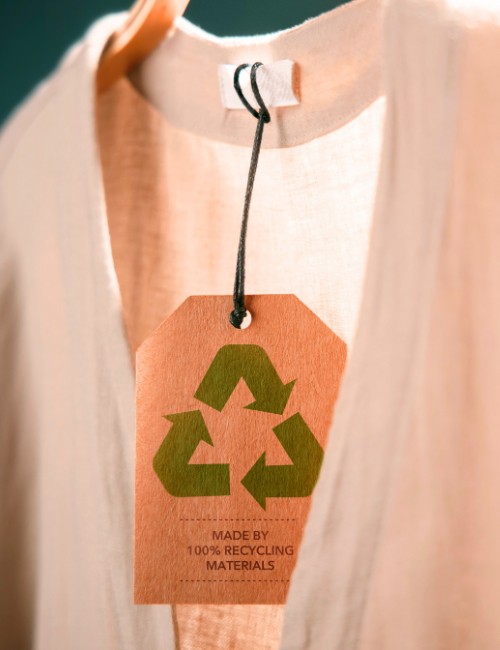
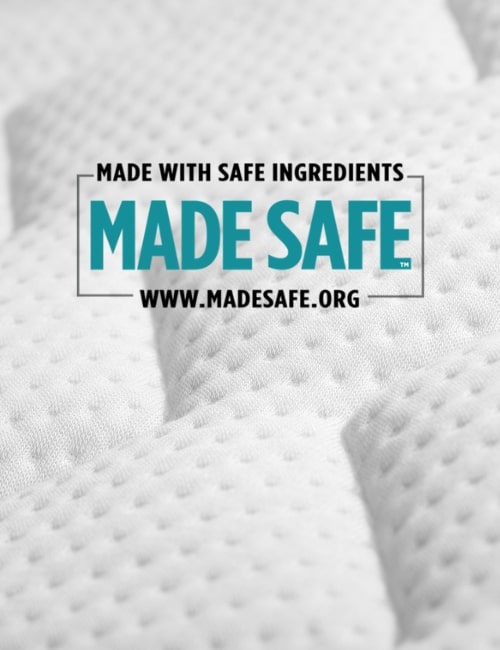
Thanks for this important article. My husband works for a B-Corp certified company and the truth is that it’s a sad joke what is passing as the “highest standards of verified social and environmental performance”. When I see products with b corp certification all I see is a company that is looking for another marketing gimmick because I have inside knowledge that that’s all it means to most companies. I have no doubts that eventually the elaborate b corp hoax will go down in flames.